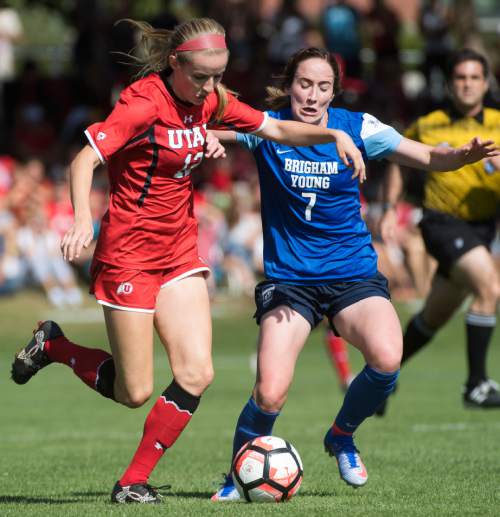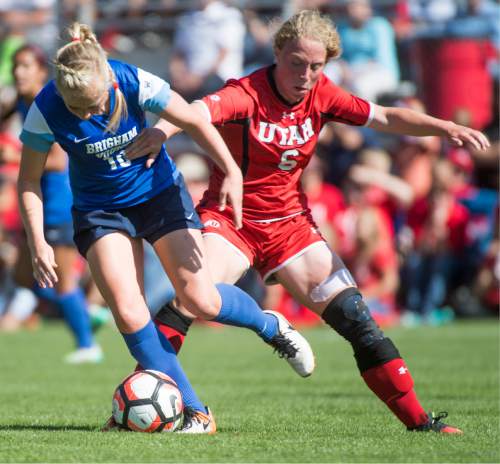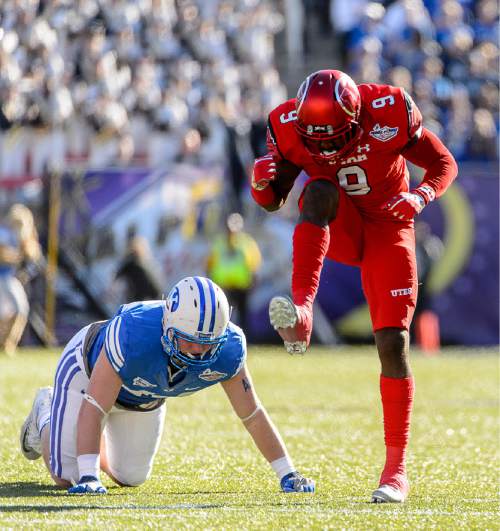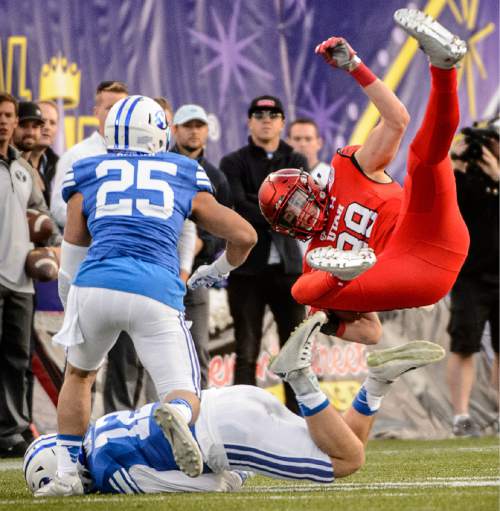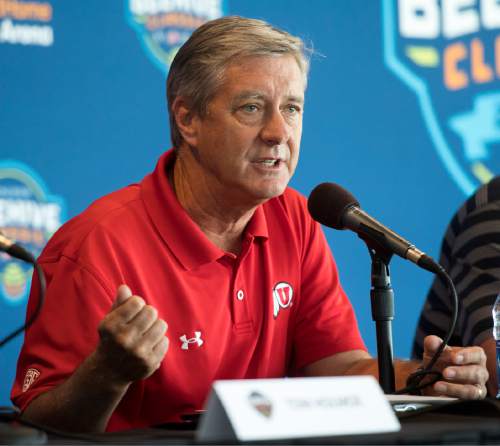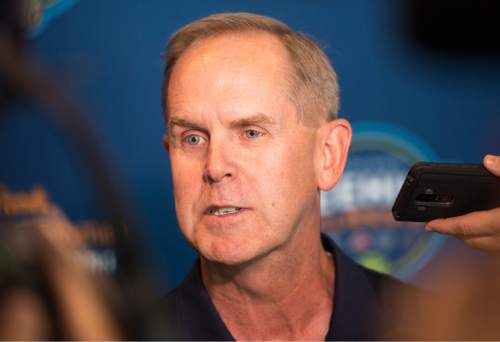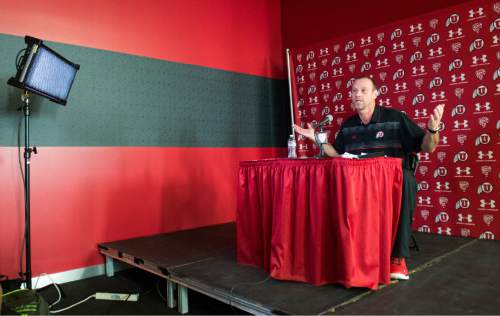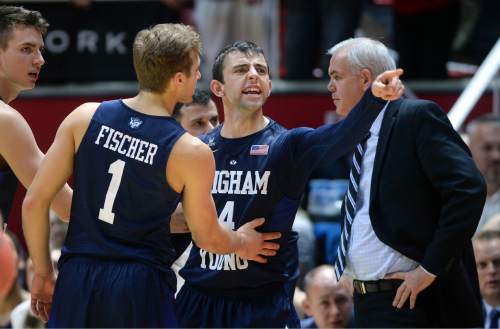This is an archived article that was published on sltrib.com in 2016, and information in the article may be outdated. It is provided only for personal research purposes and may not be reprinted.
The rivalry needs a bigger venue. Rich Manning is convinced.
On Labor Day, fans in both blue and red were lined up outside the fences at Utah's soccer field to watch BYU's 2-0 win over the Utes. The teams had been a little worried about the holiday, but still had to turn people away.
In future years, Utah coach Manning would like to play at Rio Tinto Stadium in Sandy and really test how big the crowds can get.
"It's a special thing, and the rivalry brings attention to our sport," he said. "It's not the end of the season for the conference championship, but I think it's something we have to embrace."
If it can happen on a soccer field, why not elsewhere?
Utah and BYU have seemingly had a problem for the last few years both on the football field and the men's basketball court. Since the Utes went to the Pac-12 and the Cougars went independent, there has been more public discussion about how the rivalry has "venom," is "unhealthy" or how some people in one fanbase are sick of the other.
At one time, this dynamic threatened the future of the rivalry itself — indeed leading, directly or indirectly, to hiatuses in the series once unthinkable. But today, both athletic departments seem to have a clear path to ensuring Utah and BYU continue to play in the future.
"We've pretty much got things scheduled for the next few years," Utah athletic director Chris Hill said. "Especially in football, getting that scheduled is really important, and sets a good example."
The two schools have signed contracts to play football through 2020, and have tentative dates for 2021 and 2022. After a BYU player struck a Utah player in the December meeting in men's basketball last year, leading to a 2016 cancellation in the series, the Utes announced they would resume playing BYU in 2017 as a part of the Beehive Classic, a tournament with Utah State and Weber State as well.
Signed contracts don't always mean mended feelings. The two schools have sparred in the press since the Utes announced in 2012 they would take two years off from playing the Cougars in football. But both Hill and BYU athletic director Tom Holmoe said their relationship is in a relatively good place.
"I think there was a period of time where it was tested and difficult and played out in public, where it wasn't positive for either Utah or BYU," Holmoe said last month. "Some people might have some hard feelings, still. But you ask me? My relationship [with Hill] is good. I have had great opportunities to talk with their athletic director at Utah, and Kyle Whittingham, their head football coach, is a good friend of mine."
Notably in football, the relationship between Whittingham and BYU coach Kalani Sitake has seemingly thawed some of the coldness between the programs, at least on a professional level. Still, Utah running back Joe Williams said Whittingham emphasized this week that "We don't lose to these guys," and the coach also never actually uttered — in characteristic fashion — the name of his alma mater at his 15-minute press conference on Monday.
The relationship is chillier still in basketball, where Utah coach Larry Krystkowiak's only comment on Beehive Classic was, "It's good for the state." Many Utah fans were upset by perceived meddling from the Utah State Legislature, which ordered a performance audit of Utah athletics the month after the men's basketball series was put on hiatus.
While other sports are decidedly not without friction, it's a much-embraced part of the rivalry. Inevitably, Utah-BYU matches in volleyball, gymnastics, baseball, softball and other sports draw big crowds and put non-revenue sports on a bigger stage — which is something they all crave.
After BYU's first women's soccer win at Utah since 2010, an assistant told the team as they huddled up for a picture: "Let's not celebrate too much on their home field."
"The rivalry has been around far longer than either of us have been around," BYU soccer coach Jennifer Rockwood said. "It's a great game, it brings out the soccer community. We love the game, we love the passion, and we need to keep playing."
For now — despite the protestations of some fans in each camp — that seems to be the case for football and men's basketball.
Whittingham said Monday that he thought perhaps there was less venom in the rivalry than there has been in the last few years. Sitake has called it "an honor" that Utah is BYU's rival. Ticket demand for Saturday's game is sky-high, the highest average price ($244) for either school's schedule this year.
Hill said that while he doesn't regret taking "a once-in-a-lifetime" opportunity for the Michigan series, he also doesn't foresee doing it again anytime soon. Other sports are on the books for games for years against BYU, and want to keep it that way.
The coaches say they're preparing to play a game, not worry about how fans will get along — or not get along.
"When I was at Utah, I didn't wish bad things on BYU," Sitake said. "That's just the way I chose to be. Now, are there others that don't do that? Yeah, I have met a lot of people that wish bad things on others, but that's not my job to tell them how to behave. My job is to do what I do and be comfortable with that."
Twitter: @kylegoon, @drewjay —
BYU at Utah
P Saturday, 5:30 p.m.
TV • Ch. 13


